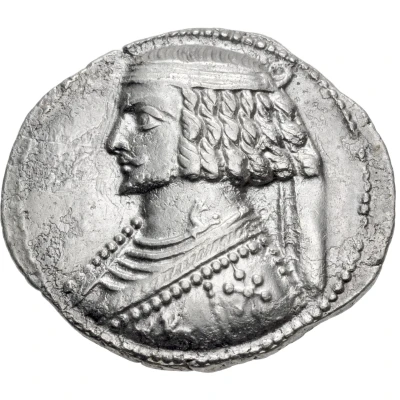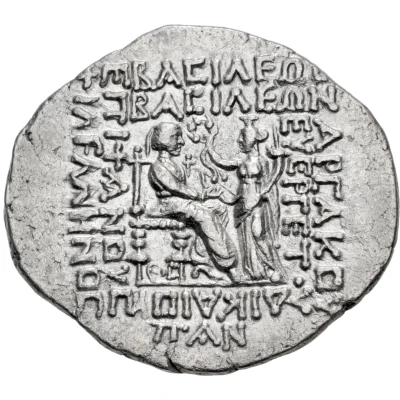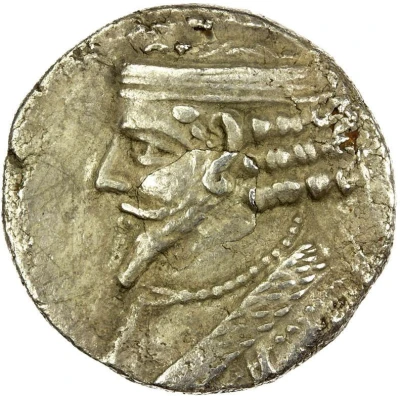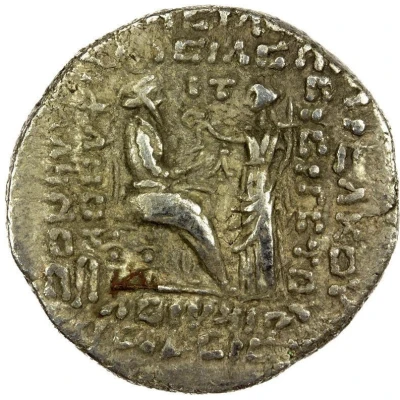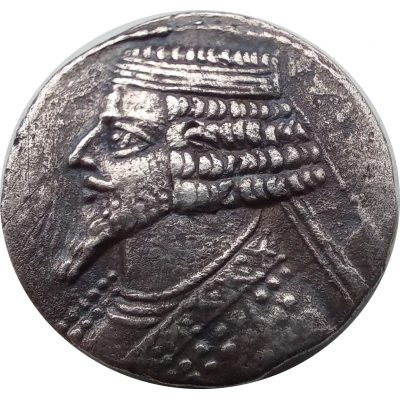
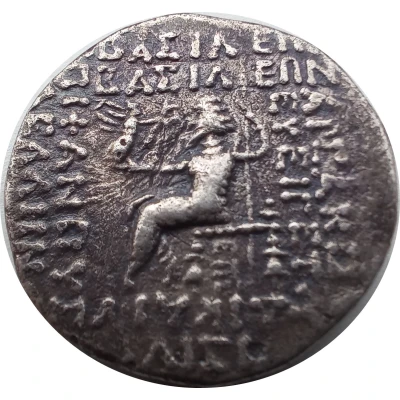

© Michael62
Tetradrachm - Phraates IV (King seated left on throne type - Seleucia) 27 BC
27 BC year| Silver | 12.14 g | 27 mm |
| Issuer | Parthian Empire (Parthian Empire (247 BC - 224 AD)) |
|---|---|
| King | Phraates IV (38 BC - 2 BC) |
| Type | Standard circulation coin |
| Year | 27 BC |
| Value | Tetradrachm (4) |
| Currency | Drachm (247 BC-224 AD) |
| Composition | Silver |
| Weight | 12.14 g |
| Diameter | 27 mm |
| Thickness | 3.4 mm |
| Shape | Round (irregular) |
| Technique | Hammered |
| Orientation | Medal alignment ↑↑ |
| Demonetized | Yes |
| Updated | 2024-10-10 |
| Numista | N#302206 |
|---|---|
| Rarity index | 94% |
Reverse
Male wearing diadem seated left on throne; in right hand Nike stands right presenting wreath; in left hand, scepter; under throne, no border.
Script: Greek
Lettering:
ΕΠΣ
ΒΑΣΙΛΕΩΣ ΒΑΣΙΛΕΩΝ
ΑΡΣΑΚΟΥ ΕΥΕΡΓΕΤΟΥ
ΔΙΚΑΙΟΥ
ΕΠΙΦΑΝΟΥΣ ΦΙΛΕΛΛΗΝΟΣ
ΔΑΙΣΙ
Translation: King of kings. Arsaces, the benefactor, the just, the illustrious, friend of the Greeks.
Comment
Soon after Phraates IV [aka Frahad] was designated the successor to the throne, he murdered his father and all his thirty brothers. In 36 B.C. he was defeated by Mark Antony and lost most of his army, however, Antony had to abandon his conquests to fight Octavian. Tiridates temporarily usurped the throne in 32 B.C., but Phraates soon defeated him. In 20 B.C., Phraates made peace with Rome. He returned the prisoners and eagles taken from Crassus and Armenia was recognized as a Roman dependency. Augustus gave Phraates an Italian concubine, Musa, whom he made his favourite wife. She persuaded him to designate their son Phraataces as his successor and to send his other sons to Rome as hostages. With all rivals out of the way, Musa and Phraataces poisoned the king and took the throne as co-rulers.It is thought that Phraates was the King that sent to three Magi to Bethlehem to pay homage to Jesus after his birth.
Photos: Sellwood 55.5 variant (no month prefix)
Interesting fact
One interesting fact about this coin is that it features a unique blend of Greek and Persian influences in its design. The king's throne and the style of his seating are inspired by Greek art, while the king's clothing and the decorations on the throne are more Persian in style. This fusion of cultural elements reflects the Parthian Empire's position as a bridge between the East and the West, and its ability to absorb and blend different artistic traditions.
